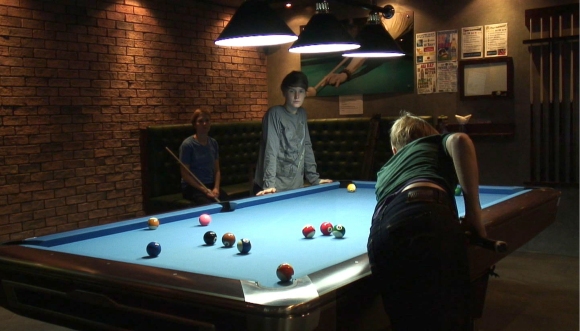PLAYERS portrays a community of 6 poker professionals who live among a larger poker community in Bangkok. While one of them, soberly explains the rules within their community, the artist herself, PILVI TAKALA, plays all the roles. Pilvi Takala currently lives and works in Amsterdam. She graduated in 2006 from Academy of Fine Arts, Helsinki (MFA). Her works are narratives based on site-specific interventions and actions, sort of exceptions in everyday life.
Ioana Mischie: PLAYERS provides a documentary peek into the lives of six professional poker players who have chosen Bangkok as their home base. How did you discover their story and what determined you to “document” their inner beliefs?
Pilvi Takala: My brother happens to be part of the community described in the film. It would have been impossible to gain access to this group without knowing someone inside. Following my brothers poker career from the very start, even before he moved to Bangkok was fascinating and I was always interested in making a work related to his world, but it seemed kind of hard to access as most of the communication between the players seemed to happen online. When my brother moved to Bangkok, this previously virtual community became a live community and it became possible to observe their lifestyle and inner rules in person at a physical location. Talking to my brother and reading the online forums had given me some kind of initial idea of the specific logic that they follow in their social life, but being among the group in person was the only way to really understand it.
Ioana Mischie: What is very personal and original about this documentary is that you chose to play the roles. How did you decide to “perform” for the screen? And also what challenges did you experienced while performing, and especially how were made the scenes where you played as a multiple?
Pilvi Takala: My method of research, after learning to play poker, was to go to Bangkok and try to learn and follow the social rules of this group for a month. So at the time of filming I had already tried to become as much like the Players as I could to be able to understand them, so it felt natural to also act as them on the film. Following social rules that were so different from my own was the biggest challenge with this project.
The film is a portrait of a group, rather than of a person and I wanted to underline that aspect by making all the characters in the film look the same. Also the mathematical nature of their rule system supported this idea, each person is equal and has identical value in their system. I wanted the images to look like examples of something, rather than documentary footage, so using myself as each young man was a way to make this clear.
All the filming was made in a very spontaneous and low key way. I would just walk into the places where the group hung out, maybe just ask a waiter if I can film and put the camera on tripod. Then I’d just play all the different characters after each other and edited them together later. I also had advise from the poker players on what kind of scenes I should include in my film.
Ioana Mischie: This film structurally combines virtual reality (images of online poker games, iphone apps) with objective reality (urban landscapes, routinized hotel, ordinary habits). How do you perceive poker as a phenomenon: more as a virtual process or more as an objective one?
Pilvi Takala: Since it became possible to play poker online, the amount of people who play and also the amount of people who play professionally has risen dramatically. The highest stakes are played online and as the online casinos are accessible from almost anywhere in the world, it’s also possible to always find someone to play high stakes. The online casinos are virtual and the game happened in this virtual reality, but you win real money that you can take out as cash and spend in Bangkok. So online poker itself is definitely virtual, but this community of players just play poker a few hours a day and the rest of the time they exist in a more physical environment.
Ioana Mischie: Poker seems to stop being just a game for its believers, unyieldingly becoming a Weltanschauung. And this might stay as a common rule for any other human passion or obsession. Could we perceive the “players” in a more general sense a portraiture of the contemporary human being?
Pilvi Takala: I enjoy the way the lifestyle of the men portrayed in Players seems unreal and even unacceptable at first and how it makes us think about our own conventions and reasoning behind those a bit more carefully.
Ioana Mischie: What inspires you as a young filmmaker and what are the most challenging themes that you like to explore in cinema?
Pilvi Takala: I’m interested in looking at how we share space, how we behave in relation to each other and how strongly we are bound by routines. I’d like to be able to reveal and contribute to the way we negotiate our shared rules and find new possibilities.
More about PLAYERS.


